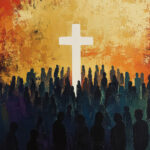In the first article of this three-part series, we confronted the glory-seeking tendencies of African Christianity by recovering Martin Luther’s biblical insight: God reveals himself not in human strength or success, but in suffering and the scandal of the cross. Now we turn to the lived expression of that faith. Framed as a question: What does it mean to live a life shaped by the cross? How does a life formed by Jesus’ work differ from one focused on the self?
What does it mean to live a life shaped by the cross?
The answers lie in recovering the biblical doctrine of union with Christ. The African Church is being discipled into a “self-shaped gospel.” It is a gospel of personal elevation, breakthroughs, and visible triumphs. Yet the New Testament presents a radically different vision: a life hidden with Christ in God (Colossians 3:3), shaped by his death and resurrection (Romans 6:3-5), and marked by self-denial rather than self-promotion (Luke 9:23).
This article contends that the cross not only saves us but also shapes us through our union with Christ. This will go some way towards correcting a Christianity that is increasingly focused on the self.
The Self-Shaped Gospel: A Hideous Exchange
Across our continent, the theology of glory takes many forms. Some trust in personal efforts to earn God’s favour—revival altar calls, loud prayers, long fasts, relentless self-exertion. Others pursue prosperity, claiming material blessings as proof of divine approval. Yet others chase the spectacular—visions, deliverance, or miracles—as if God’s power were absent from the quiet work of daily repentance, faithful parenting, pastoral care, corporate worship, or patient endurance in trials. Ordinary obedience—Spirit-fuelled but unsensational—is often dismissed as weak or lifeless. But it is precisely there, in the small and slow spaces of Christian life, that the cross-shaped power of God is most clearly at work.
Christ is sidelined; the self is central.
All these versions of the theology of glory have a common thread. Christ is sidelined; the self is central. We become the measure of our spirituality. Our emotions, our efforts, our experiences—all become the proof of God’s presence. But that is not the gospel. The Christian life does not begin with our striving or continue by our strength. It begins and continues not with our performance but with our position. That is, our position in Christ. Union with him.
This is the scandal of grace. But it isn’t new. The first believers made similar mistakes. For example, the Christians in Galatia were trying to perfect by the flesh what began by the Spirit (Galatians 3:3). But Paul warned them that to rely on anything other than Christ is to deny God’s grace (Galatians 5:4). The church at Corinth boasted so-called “super-apostles.” These men dazzled with power and eloquence, trading the weakness of the cross for the strength of the stage (2 Corinthians 11).
Any gospel that adds human achievement or seeks glory before the cross is no gospel at all (Galatians 2:21). Though Paul was confronting Peter over a specific matter, his words echo across the ages. For every generation is tempted to add to the finished work of Christ. Any gospel that adds human achievement—whether performance, experiences, or prosperity—is no gospel at all. And any message that seeks glory before the cross is no gospel at all. To preach resurrection without crucifixion, power without weakness, prosperity without perseverance, is to make the cross of Christ void (1 Corinthians 1:17).
The Cross-Shaped Life: Union with Christ
If the theology of glory misleads us, what rescues us? The answer is not merely better behaviour or more effort. It is the doctrine of union with Christ—the deep, spiritual reality at the heart of biblical Christianity.
The cross-shaped life is not a ladder to climb but a gift to receive.
Union with Christ means that believers are joined to Jesus in his death and resurrection. His story becomes our story; his righteousness becomes ours. The power of God becomes our strength. For Paul, to be saved is to be united to the crucified and risen Christ. We do not simply receive benefits from Christ—we receive Christ himself (Galatians 2:20). Union with Christ means our identity is no longer built on how well we perform; how deeply we feel; or how much we accomplish. It is built on our position in Christ, the crucified and risen Lord. This is the only position strong enough to hold us in suffering, and secure enough to carry us into glory.
The cross-shaped life is not a ladder to climb but a gift to receive. To be in Christ is to have already died and already been raised (Romans 6:3-5). We do not prove ourselves to God. We abide in the One who proved himself for us.
As John Calvin declared in his Institutes (3.1.1), “We must understand that as long as Christ remains outside of us, and we are separated from him, all that he has suffered and done for the salvation of the human race remains useless and of no value to us.” In other words, there is no gospel benefit apart from the person of Christ. Our problem is not merely a lack of blessing, but separation from the One who is the blessing (Ephesians 1:3). The solution is not better spiritual techniques. It’s real participation in Christ (Philippians 3:8-10).
The problem with the theology of glory is not just its pride but its blindness. It cannot see God in the humiliation of the cross. It cannot see grace in weakness. But this is exactly how God saves. “The foolishness of God is wiser than human wisdom, and the weakness of God is stronger than human strength” (1 Corinthians 1:25).
From Self-Shaped to Christ-Shaped
What does this mean for African believers today? It means we must repent not only of our sins but of our self-shaped gospels. We must resist the temptation to use God to achieve our own dreams and instead surrender our lives to be conformed to Christ’s. Paul said, “I have been crucified with Christ. It is no longer I who live, but Christ who lives in me” (Galatians 2:20). The Christian life is not about self-expression but self-crucifixion. As Dietrich Bonhoeffer writes in his Cost of Discipleship, “When Christ calls a man, he bids him come and die.”
The theology of glory will burn people out or puff them up. Either way, Christ is eclipsed.
This is radically countercultural in a church culture that often markets Christianity as a path to personal elevation. But the call to follow Christ is a call to die—to self, to status, to sinful desires—and to rise in the power of God’s Spirit. Only union with Christ can break the grip of self-centered religion and form in us the likeness of the crucified Lord.
Christianity in Africa is characterised by passion. But without the gospel, passion produces exhaustion or pride. The theology of glory will burn people out or puff them up. Either way, Christ is eclipsed. We need churches that teach believers to walk in Christ, not merely work for him. To rest in grace, not strive for greatness. To suffer with Christ, knowing we will be glorified with him (Romans 8:17). Union with Christ secures our identity, our assurance, our sanctification, and our hope. It is the biblical alternative to the self-shaped gospel.
The Gospel Call: Come and Die, That You May Live
Dear brothers and sisters, beware of the gospel that centres on you. Do not be seduced by the preachers who promise that God’s primary aim is to make you powerful, popular, or prosperous. The gospel is not a tool for personal advancement; it is the good news of our death and resurrection in Jesus Christ.
Beware of the gospel that centres on you.
If you are weary of striving to measure up, come to the cross. Are you disillusioned by promises of a breakthrough that never come? Look to the crucified and risen Christ. Are you tired of trying to create your own spiritual identity? Receive by faith the gift of union with Jesus.
Let the words of Paul sink deep. “You died, and your life is now hidden with Christ in God” (Colossians 3:3). That is the safest place to be—not at the centre of your own spiritual story but hidden in his. A Christ-shaped life does not end at the cross—it presses on in hope.














